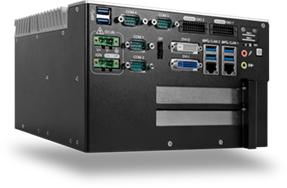ChatGPT. Midjourney. Generative AI. You can't visit any online news service or social media site without being bombarded about artificial intelligence. While much has been made about AI software's effects on society, from the job market to the digital transformation of healthcare, little has been said about the hardware running it on a medical computer, for example, or the players involved. Today's article focuses on one such prominent player, the Intel Corporation, its involvement with AI, and how that affects companies reliant on Intel's processors like Cybernet Manufacturing.
Artificial Intelligence 101: GPU and NPU
Two important pieces of computer hardware involved in AI are the graphic processing unit or GPU, and the neural processing unit or NPU. Both help the computer take advantage of AI's numerous features. This is similar to video games, databases, graphic programs, and other data-intensive programs, which also work best with specialized hardware.
AI processes such as deep neural networks and deep learning models, especially, need more specialized components to run effectively or even function.
Graphic Processing Unit
The GPU, as its name implies, handles the complex calculations involved in computer graphics, namely rendering. Unsurprisingly, GPUs have found heavy use in video games where they make the imagery smooth and seamless, whether the player is pushing through a dense jungle or jamming on stage at a rock concert.
GPUs abilities in graphic rendering are due in large part to parallel processing or multiple calculations or processes simultaneously. This makes the hardware ideal with the massive amounts of data required to train AI, especially on Large Language Models. GPUs reduce the time involved in processing all that information, making them essential hardware in all but the lightest AI tasks.
Neural Processing Unit
Despite their power, GPUs have limits, namely in machine learning and deep learning algorithms. Both are forms of AI that aim to mimic human thinking. The sheer amount of data necessary for either algorithm can slow GPUs to a crawl.
The computer industry developed the NPU as a solution. In a computer, the unit accelerates AI-specific functions: pattern recognition, natural language processing, and predictive modeling. Computers heavily involved in AI research and development have NPUs in them as well as GPUs.
Other examples of hardware specialized for AI delivery and function are field programmable gate arrays, which can be adapted for certain AI functions, and high-speed storage solutions like SSDs.
Intel and AI: Athena, Falcone Shore, and Meteor Lake
Intel is one of the world's largest makers of semiconductor chips. So it's unsurprising that the consumer and business sectors are closely watching Intel's efforts in artificial intelligence. Three of the company's notable efforts (and the industry's reaction) into the nascent technology so far include:
Project Athena: Announced back in 2019, Project Athena was Intel's push into the premium "Ultrabook" laptop market. The company encouraged hardware makers to adopt its design to support "next generation" technologies like 5G and artificial intelligence.
Falcon Shore: Intel's first notable announcement on AI can be traced to May 22, 2023. At a supercomputer conference in Germany, the company detailed "Falcon Shore," its chip aimed at supporting AI applications like ChatGPT.
Reaction to that news was shock as the company said Falcon Shore wouldn't be released until 2025 at the earliest. News of a new version, Falcon Shore 2, has been announced since then and is expected to be released in 2025.
Meteor Lake and NPU: In July last year, Intel CEO Pat Gelsinger discussed Meteor Lake, one of its first chips built with a neural processing unit that supports AI tasks. Aimed at the consumer market, Meteor Lake was to roll out across various products later that year.
Meteor Lake's rollout caught the industry's attention because Gelsinger implied users wouldn't have to rely as heavily on the cloud when using AI. This would affect Intel's competitors, whose products power cloud servers.
Travel Intel's AI Roadmap With Cybernet
In the US, Intel dominates the processor space with a market share of over 68 percent in 2023. Intel processors are prominent across the consumer market, where they are found in everything from desktop PCs and enterprise computers to 2-in-1 tablets and rugged mini PCs. On the business side, Intel chips drive many servers and data centers.
Your company most likely uses Intel processors in its daily business operations, or run in your products if you are an electronics manufacturer. The answer is most likely both, which means Intel's AI efforts will eventually impact you in one form or another.
Contact the team at Cybernet Manufacturing to stay on top of Intel news and developments like AI. We use the chip giant's products and services, which are found in the medical, industrial, and enterprise industries, almost exclusively for our computers. And thanks to our role as an Original Design Manufacturer, we're confident we can aid in customizing the right Intel-powered PC for your AI wants and needs.
Join the conversation and connect with us on this and other relevant topics - Follow us on Facebook, Twitter, and LinkedIn.


